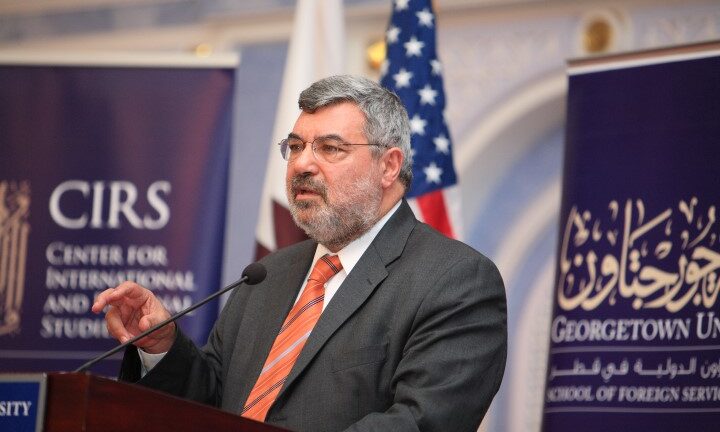American Studies, Dialogue Series, Distingushed Lectures, Regional Studies
Rami Khouri on Challenges Facing the Next US Administration

CIRS kicked off its Distinguished Lecture Series for the 2008-2009 academic year with a lecture by Rami Khouri, editor-at-large of the Daily Star newspaper in Beirut and Director of the Issam Fares Institute for Public Policy and International Affairs at the American University of Beirut. Khouri’s talk, held at the Doha Diplomatic Club on August 24, 2008, was attended by an audience of 350 people.
Khouri’s lecture was titled, “America, the Middle East, and the Gulf: An Arab View of Challenges Facing the Next U.S. Administration,” in which he emphasized that the Middle East is currently undergoing a period of momentous change within itself and in its relationship with the West. This, he said, was a pivotal moment in history as executive decisions being made in the current political climate are likely to have both short-term and long-lasting consequences. Past failures, he noted, could have been avoided had there been better political leadership in the region. According to Khouri, contrary to popular belief, the fall of communism in the 1990s had more significant effects on the Middle East than did the terrorist attacks of September 11, 2001. The conclusion of the Cold War presented one such opportunity for the Middle East, when the region saw a revival of political movements, a newfound dynamism, and emergence of new players. Sadly, he said, the historic opportunities thus presented to the Middle East were lost. Khouri named five immediate and short-term changes looming on the horizon with profound consequences for the Middle East. They include: 1. The election of a new president in the United States; 2. The likelihood of the United States and coalition troops withdrawing from Iraq and its consequences; 3. A possible resolution of the Iranian nuclear issue; 4. Movement on the Arab-Israeli conflict; and, 5. Global energy shifts resulting in increasingly significant roles played by Russia and China. Along with these short-term changes, Khouri named the five major crises that are affecting the region and that need to be addressed urgently by the region’s political leaders. These crises are the lack of a stable and secure statehood; the uncertain nature of the relationship between citizens and the state; the lack of availability of basic human needs services and socioeconomic development; the crisis of individual and national identities; and the relationship crisis between the Arab world and the rest of the world.Khouri concluded by summing up the issues that are of the greatest concern to Arabs. The need for accountable governments is perhaps the most widely sought-after goal, as is the yearning for protection of civil rights and security. For now, Khouri argued, there is neither the bold leadership nor the permissive international environment needed to tackle the Middle East’s many problems.
Article prepared by Suzi Mirgani, CIRS Publications Coordinator.
Rami Khouri Bio
Rami George Khouri, 59, a Palestinian-Jordanian and US citizen whose family resides in Beirut, Amman and Nazareth, is editor-at-large, and former executive editor, of the Daily Star newspaper in Beirut, and Director of the Issam Fares Institute for Public Policy and International Affairs at the American University of Beirut. He is a book author and writes an internationally syndicated weekly column.
He is a nonresident senior fellow at the Dubai Initiative-Belfer Center/JFK School of Government at Harvard University, and a lecturer at the University of Chicago and Northeastern University in the USA. In the 2001-02 academic year he was a Nieman Journalism Fellow at Harvard University, and has also had fellowships at Stanford, Syracuse, and Mt Holyoke universities. In 1976-2001 he lived in Amman, Jordan, where he was editor in chief of the Jordan Times newspaper, hosted television and radio shows on current affairs and ancient history and archaeology, was general manager of Al Kutba, Publishers, and wrote for leading international publications, including the Financial Times, the Boston Globe and the Washington Post.
He often comments on Mideast issues in the international media, including the BBC and U.S. National Public Radio, and lectures frequently at conferences and universities throughout the world. He is a member of the Leadership Council of the Harvard Divinity School, a member of the board of the Center for Contemporary Arab Studies at Georgetown University and the Jordan National Museum, and a member of the international advisory council of the International Committee of the Red Cross. In 2002 he was named a member of the Brookings Institution Task Force on US Relations with the Islamic World. He also served for many years as the chief umpire for Little League baseball in Jordan.
He has BA and MSc degrees respectively in political science and mass communications from Syracuse University (USA), is married to Ellen Kettaneh, and has two grown sons.